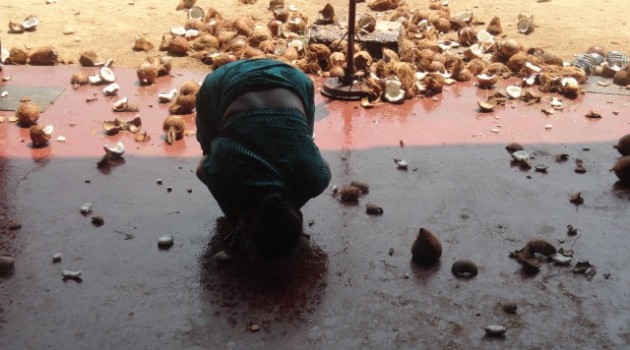A Brief Colonial History Of Ceylon(SriLanka)
Sri Lanka: One Island Two Nations
A Brief Colonial History Of Ceylon(SriLanka)
Sri Lanka: One Island Two Nations
(Full Story)
Search This Blog
Back to 500BC.
==========================
Thiranjala Weerasinghe sj.- One Island Two Nations
?????????????????????????????????????????????????Friday, February 2, 2018
Delays, Dilution And Deal-Making Mar Establishment Of OMP: Friday Forum

February 1, 2018
 The Friday Forum charged those responsible for the establishment of the Office on Missing Persons (OMP) of deliberately delaying, diluting and indulging in deal-making.
The Friday Forum charged those responsible for the establishment of the Office on Missing Persons (OMP) of deliberately delaying, diluting and indulging in deal-making.
Pointing out that the OMP
was one of the four mechanism the Government had promised to put in
place in what it claimed was a ‘comprehensive approach to dealing with
the past, Friday Forum
in a media release expressed regret and concern that little has been
done to operationalize the same, although 28 months have passed since
the plan was announced.
Friday Forum
also argue that the process has been marked by sloth, lack of
transparency, weak engagement with victims and political actions
designed to undermine the institution’s independence.
The full text of the media release is given below:
Establishing the Office of Missing Persons: Delays, Dilution and Deal-making
 The
Office on Missing Persons is one of the four mechanisms that the
government promised in its ‘comprehensive approach to dealing with the
past’. Whilst OMP is the only mechanism on which any formal progress has
been made in the 28 months that have passed since the government
announced its plan, even this has not yet been formally constituted and
operationalised. Each step of the process thus far to establish the OMP
has been marked by slow progress, a regrettable lack of transparency,
poor engagement with victims and troubling political actions to
undermine the independence of the institution.
The
Office on Missing Persons is one of the four mechanisms that the
government promised in its ‘comprehensive approach to dealing with the
past’. Whilst OMP is the only mechanism on which any formal progress has
been made in the 28 months that have passed since the government
announced its plan, even this has not yet been formally constituted and
operationalised. Each step of the process thus far to establish the OMP
has been marked by slow progress, a regrettable lack of transparency,
poor engagement with victims and troubling political actions to
undermine the independence of the institution.
In mid-2016, a Bill to
establish the OMP was drafted by a small government-appointed committee
that was not publicly announced, working in parallel and disconnected
from the ongoing ‘victim-centric’ process to consult the Sri Lankan
public on the proposed reconciliation mechanisms that had been initiated
by the government in January 2016.
When civil society actors
challenged the government on why it was preempting the Consultation Task
Force (CTF) process and report, the government’s Secretariat for
Coordinating the Reconciliation Mechanisms (SCRM) responded that the
government’s rush to establish the OMP was to expedite support to
families of the missing and disappeared. Over one and half years later,
in the absence of minimally constituting the OMP, these claims ring very
hollow.
Responding to criticisms
about the lack of consultation of victims, prior to finalizing the OMP
Bill to be presented in Parliament, the SCRM arranged a brief
consultation in Colombo for the drafting committee with a few family
members of disappeared persons. The CTF was also requested to provide
early submissions on the OMP to the drafting committee. In response, the
CTF provided an oral submission, and also produced an Interim Report in
August 2016 which compiled OMP-related submissions that it had received
from the public.
Since most of the CTF’s
public consultation work had not taken place at the time of writing, the
CTF’s Interim Report was based solely on written submissions that it
had received as of 17th July 2016 and a few consultation meetings
conducted before 8th August 2016.
Questionable Passage of the OMP Act
A Bill to legally establish
the OMP was submitted to Parliament and was passed on 11th August 2016
following unorthodox procedures after a disruptive debate. The brief,
truncated debate, and passage of the Bill without a vote, seriously
undermined the sense of the OMP as an institution established following a
considered due democratic process.
Lack of Consideration of Victims Voices and Concerns
It was unclear whether the
8th August 2016 Interim Report of the CTF was reviewed by the government
prior to the hurried passage of the Bill on the 11th August,
or even if its content was considered later when subsequent amendments
were made to the Act, before it was formally signed into law on 23rd August
2016. When the CTF’s Final Report was released on 3rd January 2017, it
was apparent from Annex 15 of that document that the government had not incorporated a single one of
the CTFs Interim Report recommendations reflecting the content of
public submissions and victims views into either the draft Bill or the
final OMP Act.
Given the government’s
declared haste in enacting legislation to institute the OMP, it is
ironic that it was only at the 3rd January 2017 launch of the CTF Final
Report that the Foreign Minister announced that the Gazette on the OMP
Act had finally been signed by President Sirisena – giving effect to the
law after several months of inaction.
The OMP Act was further
amended on 22nd June 2017 by a unanimous vote in Parliament which
removed a key paragraph that explicitly had allowed the OMP to enter
into independent financing arrangements with external sources. Many
victims groups and analysts saw this as seriously compromising the
independence of the OMP because it would now be entirely dependent on
the government for finances.
Laying the Foundation for the OMP on Uncertain Ground
